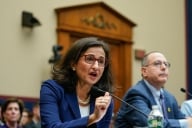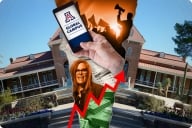You have /5 articles left.
Sign up for a free account or log in.
Scholars often present unpublished work at conferences. But while they may be willing to expose an unpolished set of ideas to a group of peers, academics may be less eager to have those peers turn around and broadcast those ideas to the world.
The debate over whether scholars should live-tweet sessions from academic conferences, especially without warning, saw a revival this weekend. Naturally the conversation itself, which has spawned at least one effort to draft formal guidelines for what should be considered fair game for the academic Twitterazzi, took place on Twitter.
“[I]t's presumptive to assume that we should share other people's work w/o asking,” wrote @eetempleton, an assistant professor of English.
“I would disagree,” rejoined @alothian, another English assistant professor. “when I speak & others tweet, I learn a LOT about my own ideas.”
Some worried that having someone tweet their insights before they publish might increase the likelihood that they will be scooped by a colleague — although others regarded that notion as slightly paranoid.
The organizers of conferences, academic and otherwise, historically have been able to control what leaves the room by managing the access of any reporters who are in attendance. But that has changed in an era when anyone with a smartphone and an Internet connection — de rigueur at most conferences — is potentially a journalist with autonomous publishing privileges.
“The debate over live tweeting at conferences is, in many ways, about control and access: who controls conference space, presentation content, or access to knowledge?” wrote Roopika Risam, a doctoral student at Emory University, on her blog.
Many academic conferences, and even individual sessions at those conferences, have associated Twitter hash tags — often suggested by the conference organizers themselves. But it is rare for a speaker, or the moderator of a discussion panel, to directly address the issue of Twitter at a particular conference event.
That might change as the debate over appropriate Twitter use continues.
In response to the discussion thread over the weekend, which began on Saturday and continued into Sunday, Kathleen Fitzpatrick, director of scholarly communication for the Modern Language Association, wrote a blog post addressing the etiquette of tweeting conference sessions.
“If somebody says they’d prefer not to be tweeted or blogged, respect that,” wrote Fitzpatrick. “Whatever your feelings about the value of openness — and openness ranks very high among my academic values — not everyone shares them.”
Tamara K. Nopper, an adjunct lecturer of Asian American studies at the University of Pennsylvania, did not share some of her colleagues' views on the value of conference tweeting. Over the weekend Nopper fired off a series of tweets along those lines. She later deleted them, but not before the contentious tone of the debate inspired the hashtag #Twittergate. "I deleted my tweets because I saw a debate that was spiraling in weird directions and didn't want to be part of the fuckery," she wrote in an e-mail interview with Inside Higher Ed.
Where some of her peers consider Twitter a constructive tool for batting around ideas, Nopper says she believes that the main reason scholars tweet sessions has more to do with personal branding at a time when many academics are scrambling to be noticed. "Along with it simply being distracting to some presenters, we need to consider how live-tweeting at conferences is a form of neoliberalism, with scholars employing social media to increase name recognition in and outside of the academy in hopes of getting more paid opportunities," she wrote.
"[W]e live in an intellectually lazy society with many people responding to others' tweets but clearly not reading something for themselves beyond a sensationalistic quote or headline or an abbreviated summary -- often using social media language or symbols — in which ideas can get lost in translation if they were even understood at all," wrote Nopper. "Yet people attempt to build their brand (and social media followers) by putting out others' ideas very quickly in real time without always having to reflect on whether they actually understood them."
Although Nopper is a relatively young academic, having earned her doctorate in 2008, Adeline Koh, an assistant professor of literature at Richard Stockton College who joined the #Twittergate conversation later, said she believes in general the debate breaks along generational lines. “I see this as a divide between older and newer forms of academic culture,” she said in an interview. “On the traditional model, you don’t put an idea out there until it’s fully formed and perfect.”
Although she counts herself as a member of the younger generation, Koh says she is sympathetic to the anxiety of having one’s ideas paraphrased and broadcast in an ostensibly protected environment. “We academics are not used to putting forth arguments that are not complete,” she said.
For the latest technology news and opinion from Inside Higher Ed, follow @IHEtech on Twitter.








